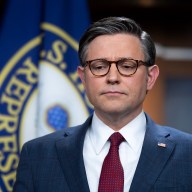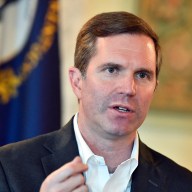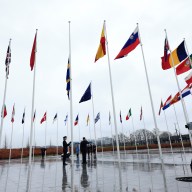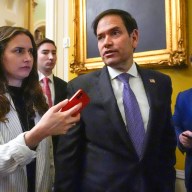By David Brunnstrom and James Pearson
WASHINGTON/SEOUL (Reuters) – North Korea warned on Thursday it is planning its toughest response to what it deemed a “declaration of war” by the United States after Washington blacklisted the nuclear-armed country’s leader, Kim Jong Un, for human rights abuses. Pyongyang described the sanctioning of Kim as a “hideous crime,” according to North Korea’s official KCNA news agency.
“… the U.S. dared challenge the dignity of (North Korea) supreme leadership, an act reminiscent of a new-born puppy knowing no fear of a tiger,” the statement said.
“This is the worst hostility and an open declaration of war against (North Korea) as it has gone far beyond the confrontation over the human rights issue.”
In response, the U.S. government urged Pyongyang to refrain from statements and actions that raise tensions in the region.
The United States imposed its first sanctions targeting any North Koreans for rights abuses on Wednesday, blacklisting Kim along with 10 other people and five government ministries and departments. The action affects assets within U.S. jurisdiction. U.N. Secretary-General Ban Ki-moon, a former South Korean foreign minister, hopes China will urge its ally North Korea to cooperate internationally on human rights, his spokesman, Stephane Dujarric, said on Thursday in New York. Dujarric said that Ban, who is currently visiting China, “believes that discussion of human rights concerns allows for a more comprehensive assessment and action when addressing security and stability concerns on the Korean Peninsula.” China’s foreign ministry, when asked about the U.S. decision, said it opposed the use of unilateral sanctions. China argues that the human rights situation in North Korea is not a threat to international peace and security, and has sought to prevent the issue being discussed at the U.N. Security Council. U.S. Secretary of State John Kerry said he had spoken to Chinese Foreign Minister Wang Yi and hoped that Beijing would continue to cooperate with U.N. sanctions aimed at rolling back North Korea’s nuclear weapons program. North Korea has been under U.N. sanctions since 2006. In March, the Security Council imposed harsh new sanctions on the country in response to North Korea’s fourth nuclear test in January and the launch of a long-range rocket in February. Some analysts and diplomats have warned that the U.S. action could limit cooperation with China on further action.
U.S. Ambassador to the United Nations Samantha Power said last month that the United States would seek to identify people and entities linked to a series of recent ballistic missile tests by Pyongyang, in violation of a U.N. ban, who could be sanctioned by the U.N. Security Council. The cooperation of China and Russia would be needed for any further designations. Senior U.S administration officials said the new U.S. sanctions showed the administration’s greater focus on human rights in North Korea, an issue long secondary to Washington’s efforts to halt Pyongyang’s nuclear and missile programs. “Under Kim Jong Un, North Korea continues to inflict intolerable cruelty and hardship on millions of its own people, including extrajudicial killings, forced labor, and torture,” Acting Undersecretary for Terrorism and Financial Intelligence Adam J. Szubin said in a statement. Inside North Korea, adulation for Kim is mandatory and he is considered infallible. A 2014 report by the United Nations, which referred to Kim, 32, by name in connection with human rights, triggered a strong reaction from Pyongyang, including a string of military provocations. The U.S. Treasury Department identified Kim’s date of birth as Jan. 8, 1984, a rare official confirmation of his birthday.
South Korea, which cut all political and commercial ties with its own sanctions against the North in February, welcomed the U.S. move, saying it will encourage greater international pressure on the North to improve its human rights record. (Writing by Michelle Nichols; Additional reporting by Arshad Mohammed; Editing by Yara Bayoumy and Steve Orlofsky)


















